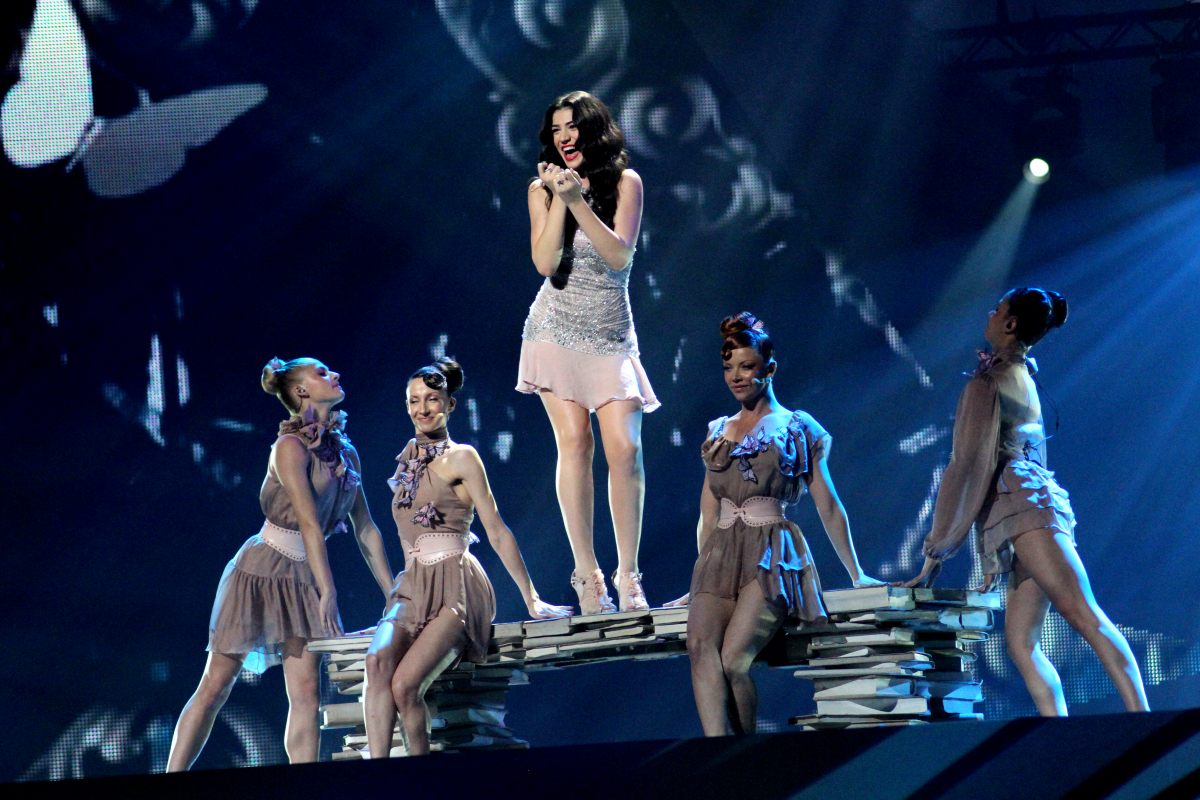Bogdan Honciuc, our Transylvania correspondent, scoured the Romanian press and found a whole bunch of haters. In the following dispatch he sticks up for Mandinga, who he believes are moving from strength to strength despite domestic criticism.
I was as surprised as many Eurovision fans that Mandinga did not fare better at this year’s Eurovision. They had it all. The beautiful girl (who gracefully accepted the title of Eurovision’s Next Top Model 2012). The catchy tune. The dance moves. And an extensive promotional campaign, both online and on the ground. Moreover, “Zaleilah” proved to be a radio-friendly hit in many countries, and a series of predictions from bookies to bloggers to fan polls anticipated that it would land in the Top 5 of the Grand Final in Baku.

It was not to be. Romania only received douze points from neighbouring Moldova, and ended up in 12th position. Contrary to popular belief, Romania is not so popular among its Eastern neighbours. First of all, Romania is “a Latin island in a Slavic sea” and Bulgaria, Serbia, Russia, and Ukraine usually neglect our entry, preferring to vote for their Slavic neighbours. Despite our constant support of Hungary, Budapest blissfully ignores us as well. And, last but not least, because Romanians are not well perceived in Europe for various reasons, Western countries have only voted for our entry in direct proportion with the number of Romanian immigrants living in those countries. As such we can only count on Spain and Italy to vote favourably for the Romanian entry. The only neighbour we can definitely count on is Moldova, and vice-versa, which is simply because it once belonged to Romania and we basically share the same culture.
However, 12th place is nothing to be ashamed about. In fact it’s an honourable place to finish. Our country fared much better than Eurovision darlings such as Greece, Cyprus, and Ireland, not to mention Norway, France and the U.K. In the first semi-final, Romania finished second with the televtoers and third overall. And in the final Romania finished seventh with the public.
Sadly, the Romanian public and press don’t like to focus on the positive. Contrast their reaction with that of the British public. Despite the fact Engelbert finished next-to-last, the public in Britain did not blame him for the result. They blamed the rest of Europe. In Romania, however, the public turned on Mandinga, and made Elena Ionescu the principle scapegoat.
It started early. Despite the band’s win at the national contest in March, and its growing popularity on the Internet prior to Eurovision (the number of Facebook likes, YouTube views, and Twitter followers grew exponentially every week), Romanian journalists dismissed Mandinga’s chances of winning before they even landed in Baku. Influenced by the media, many Romanians condemned the choice of a tune sung in Spanish, composed by Costi Ionita (a songwriter known for Oriental tunes), performed by a Cuban-influenced band fronted by a woman generally considered to be just another pretty face with an Auto-Tuned voice. So, unlike most other Eurovision participants, Mandinga did not enjoy the same support back home, which put enormous pressure on the band and especially on young Elena, who had to sing live and represent her incredulous country in front of a world audience.
Mandinga performs “Zaleilah” at Romani’s national selection contest.
The situation didn’t improve after Romania cleared the first semi-final. An earpiece defect that affected Elena almost ruined Mandinga’s performance. But Elena managed to carry on and take Romania to the Grand Final. Viewers back home still blasted her performance. Many wondered if the sound really went out in her ear and if maybe it was an act to cover for the fact that Elena could not actually sing live. Had the technical glitch never happened, perhaps Mandinga’s detractors would have shut up. Instead the pressure piled up for Elena to deliver in the final. Despite a vastly improved, nearly flawless performance on May 26, Mandinga failed to fulfill its promise of making the Top 5.
The Romanian media sounded so disappointed, as if the band had been eliminated from the contest altogether. Fueled by the press, many viewers voiced their criticism and their dissatisfaction yet again. This “loss” confirmed that “Zaleilah” had been a poor choice. Shamefully, almost nobody, except a few journalists, waited for Mandinga at the airport in Bucharest. It was another blow for the band which was poised to begin its ten-year anniversary tour. To add insult to injury, Mandinga’s ten-year anniversary concert, originally scheduled for May 31, was postponed until mid-summer because of the weather.
Fortunately not everything is bleak for Mandinga. Not by a long shot. The band has extended its international fan base to the point that its status updates on Facebook are now trilingual – in Romanian, English, and Spanish. Elsewhere it just won “Best Group” at the annual Romanian Music Awards. It has launched the documentary “Primii 10” (First Ten Years) at the Transylvania International Film Festival. And it released a greatest hits album, “Club de Mandinga”, which is now being promoted on a national tour. Most importantly, the networking and exposure in Baku has already paid off. Mandinga has several concerts lined up in Azerbaijan, Russia, Dubai, Mexico, India, and China. If only the Romanian media could catch up with the band’s success!











MANDINGA NO 1 IN THE WORLD.THEIR SHOW WAS VERY VERY VERY BEAUTIFUL.ELENA IS THE MOST BEAUTIFUL GIRL IN THE WORLD AND SHE WAS SING VERY, BUT VERY GOOD AT EUROVISION <3.
Whay Romanian press? The shitty tabloids? Please, that is printed toilet paper, not serious media. When are are cheap, you hate everybody else because is so much better than you. And by the way, we do not hate Mandinga, we love it. Frustrated people always talk bad about everybody else. And let’s face it, if Mandinga was the winner, Romania could not support financially speaking to host Eurovision. Did Europe afforded to help?
Sorry, but this article is totally wrong. Spain give points to Romania because of the diaspora.
Anyway, I love the song and I think Mandinga deserved a better place.
Kisses from Spain.
una parte des rumanos carecen del espíritu patrio y hay que aunarse para que actuemos como una fusión unida. la tema y la actuación de Mandinga eran sumamente animadas por les residentes oriundos de la Rumania y despues del resultado, mandinga fui criticada.
Oh please stop complaing about the lack of support. How the hell did Romania got the 3rd place in 2010 and 2005? what about the surprisingly 16th place in 2011 (above better songs like Estonia, Hungary, Switzerland). Hungary does not ignore Romania, actually they have given Romania a lot of points the recent years. You have to admit that Romania hasn’t sent great entries the last years (exceptions 2005, 2006, 2010). The Italian and Spanish points to Romania come from immigrants (especially in Italy). About Elena: she did a good job in Eurovision but she looked so awful in comparison… Read more »
This is the Romanian press, this is what they always do, they criticize almost everything that is Romanian and even if something is really great, they want us to be ashamed of it because it simply…is Romanian. This attitude is especially about music and young singers and bands. If you search a bit the internet, you will notice how Romanian press hates all international Romanian artists, that everybody else loves, and sadly they manage to induce to people to think that way too. It’s true Elena’s performance was not the best in the final (probably she was tired and nervous),… Read more »
Unfortunately for Mandinga, their presentation of the song verged on the cheese factor. I did like the song and hope it would do better, but the performance was almost as cringe worthy as Scooch’s Flying the Flag (for you).
I think they would’ve done better if they kept their National Final performance (or something similar). It was still cheesy, but in a better way. The guys, especially Valle/Zach with the hat and tuba, looked and acted really lame during their performance in Baku, IMO.